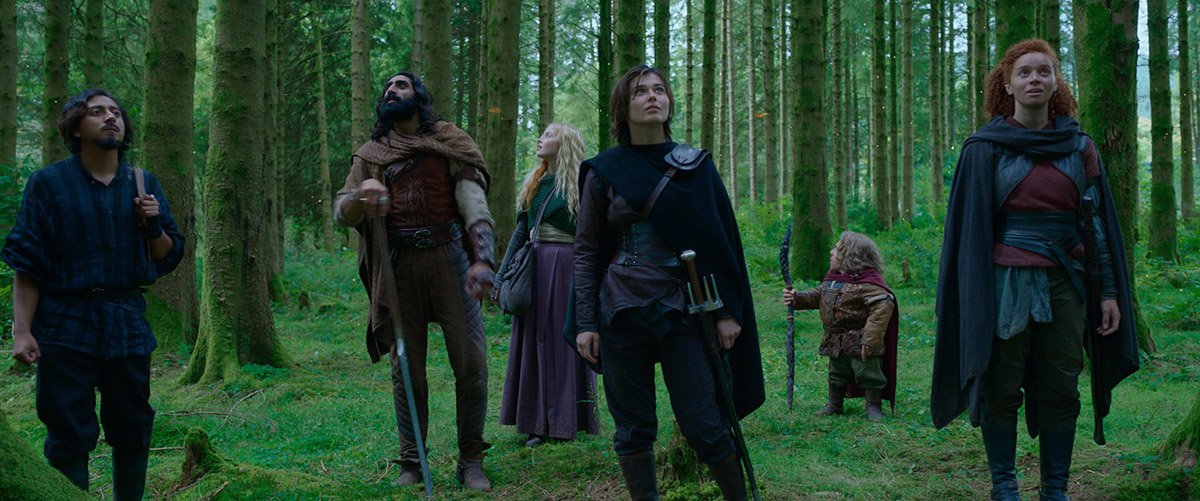It happened quickly. Sitting in the dark pushing my way through the muddy middle plotting of Black Panther: Wakanda Forever, or more recently this week, absorbing the tonal mishmash of the first two episodes of Disney+’s new Willow extension. “Well, it ain’t Andor,” my brain shrugged, and my expectations — and interest — accordingly dropped.
No: it absolutely is not plausible or even particularly self-kind to expect 98% of what Disney does, for the rest of its existence as a content provider, to be as good as one show. (My take on all this circa OWK remains the more reasonable model.) But what’s happening now is kind of like returning home from the adventure and finding home… smaller. What? I seriously liked Moon Knight so much I watched it twice? Was I high??
It’s aggravating in the extreme to be suddenly and vibrantly refreshed on how good it can be when it’s good, and realize you’ve been fully inured to “okay” for a very, very long time.
Something else that occurred to me watching Willow: this might just be the way it is now. “This” meaning: If you, as a showrunner, want to cut your teeth on a sloppy, YA-skewing fantasy adventure that wants to be The Princess Bride, the only way to do it might be to plant your posterior on Kathy Kennedy’s doorstep and badger her about your lifelong worship of Willow until she gives in and lets you do a series, because theoretically the ingredients are there that will let you do your thing under the relative protective shield of “pre-existing franchise,” even though (in Willow‘s case, particularly) that definition is stretched mighty thin. But in other words: the only way to get new work made and seen right now might be to pretend it’s connected to an existing piece of IP, and then hope no one notices that you haven’t really done much with the IP-ness of it.
Show-Willow‘s Leo-DiCaprio-points to movie-Willow are frequent and intentional; they just don’t seem particularly creative, or even enthusiastic. Warwick Davis seems out to sea on the whole thing (a shame, as he can be quite a fine comic actor in other circumstances), wildly missing the tone the show seems to be aiming for, and doing little or nothing to connect the character to any sense that the events of the movie had an impact on him. The first two episodes play like someone decided to try to do the Reddit version of The Last Jedi, where Rey shows up on the island and, instead of Luke tossing the lightsabre over his shoulder, he immediately says “Great, I’ll train you! No, I wasn’t hiding here for any particular reason. Let’s go!” [Lightsabre blade ignites with hum]
The most interesting parts of the first two episodes are the parts that have nothing to do with Willow, Elora, or any of the legacy characters or worldbuilding. (And even calling them “interesting parts” is really more relative than quantitative.) The fun is in the Dungeons & Dragons of it all — if I had to guess, I’d guess Jon Kasdan wanted to make a Dungeons & Dragons show instead, but lost out on the opportunity to write the Chris Pine movie, so settled for this — the building of an adventuring party with its stock Classes and Subraces, and letting them start to ping pong off each other (and occasionally kiss, in a refreshingly palms-up containment of the queerness of these stories, explicit rather than implied).
I started playing D&D late in life, and for reasons that aren’t particularly clear, I based a lot of my early character-building on half-remembered arcana from a different sector of the Willow multiverse: the Chris Claremont trilogy of novels, “based on a story by George Lucas” (sure), which saw an older, embittered Willow (now called Thorn) travelling to the other side of the world after a magical cataclysm wiped out Tir Asleen, Madmartigan and Sorsha, and pretty much everything else. You know: Last Jedi stuff.
I read those novels about twenty years ago and couldn’t make heads nor tails of them; but I read them again after I started playing D&D and they suddenly made a lot more sense, and integrated eerily with the instincts that led me to use some of their plot points in character generation. The Claremont novels are absolutely a D&D campaign. The hero (Elora) is even a Bard, which (again) made no sense to me at all the first time, but is so bloody clear and lucid now that it came as no surprise that the Chris Pine movie does, indeed, cast him in the same Class.
My own D&D characters are multiplying faster than catholic rabbits. I’m a Dwarf Druid in my prime campaign (herself the sibling of my inaugural character, based directly on Willow / Thorn Drumheller, and killed in action in a climactic battle against a Flame Skull); I’m a multiclass Warlock/Bard in my second, and I just ginned up an Artificer for my third. Plus there’s the Witch Hunter over in Hammerworld, and my beloved non-binary backup character, a human Ranger I’ve only played once, and dearly wish to return to. In the meantime, I am toying with writing them a novel. And so the adventure continues.
ITEMS!
ITEM!: You wouldn’t think a sweet omelette with dates and cinnamon would be a thing but it is entirely a thing
ITEM!: Having successfully snared “tederick” handles on pretty much every fledgling Twitter replacement (except TikTok, which hates me), I am definitely not paying attention to my socials this winter. If you see me in public, please: leave me be.
ITEM!: I might write a longer thing about this but Dead Eyes has me thinking a lot about my 30+ years looking, at a guess, 30% like Tom Hanks.
ITEM!: It’s Christmas on Letterboxd, and here’s what I’m watching.
